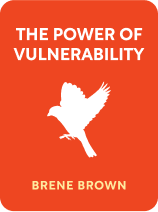

This article is an excerpt from the Shortform book guide to "The Power Of Vulnerability" by Brené Brown. Shortform has the world's best summaries and analyses of books you should be reading.
Like this article? Sign up for a free trial here .
Do you want to further your understanding of Brené Brown lecture? How can these The Power of Vulnerability discussion questions help you relate her messages to your own life?
The Power of Vulnerability was a TED Talk given by Brené Brown about shame, vulnerability, and wholehearted living. Brown explains that in today’s culture, it’s hard to ever feel like you’re “good enough,” so she shared practices on how to stop feeling shame and comparing yourself to others.
Continue reading for exercises and discussion questions inspired by Brené Brown’s lecture.
The Power of Vulnerability Discussion Questions
Many people don’t want to discuss shame or vulnerability. In fact, today, people are lonelier, more obese, and more addicted than ever before because they opt to distract or numb themselves rather than address their insecurities or shame.
In her lecture series, The Power of Vulnerability, Brené Brown breaks down the various aspects of shame, addresses the importance of vulnerability, and offers 10 practices that you can use to embrace vulnerability and start living a wholehearted life.
Here are The Power of Vulnerability discussion questions inspired by Brené Brown.
Identify Shame Triggers
Knowing your shame triggers can help you navigate your emotional responses and build healthy habits.
- Identify a personal shame trigger. What do you think made this topic triggering for you?
- When shame is triggered by this topic, what is your typical response? Describe it. (Think about the responses of silence, complacency, and aggression.)
Handle Shame
While shame is unavoidable, you don’t have to let it control your life.
- What are your physical responses to shame? (For instance, you may get tense, warm, or dizzy.)
- When you feel these physical sensations start to emerge, what are some practices that you could use to calm yourself down to avoid spiraling? List two to four. (For instance, you could tap your forehead, take deep breaths, or walk away to compose yourself.)
Identify Your Emotional Armor
Knowing what pieces of “emotional armor” you use will help you handle your shame in a healthier way.
- What pieces of emotional armor do you have? (For instance, you may be a perfectionist or use numbing behaviors.)
- Describe an experience in which your emotional armor got in the way of dealing with shame in a healthy way.
- Have you ever believed one of the “myths about vulnerability”? If so, which one and why?
Live Authentically
Authentic living leads to better decision-making and a healthier lifestyle. To begin living authentically, let go of external expectations, and make choices based on what’s best for you.
- Think of a time you agreed to do something that you didn’t want to do, only to regret the decision later. Describe the experience.
- How could saying “no” have helped you in that situation?
- Think of a time you wanted to do something but allowed shame to get in the way. Describe the experience.
- With this in mind, what similar opportunities are coming up in the near future? How can you prevent shame from holding you back next time?
Practice Gratitude
Gratitude is one of the most important aspects of wholehearted living. It prevents foreboding joy (a fear of the “other shoe dropping”) and allows you to maintain perspective.
- List three to five things that you’re grateful for in this moment. Explain why you’re grateful for each.
- How does this list affect your perspective? (For example, if you’re having a rough day, does this list bring some light into your day? If you’re having a good day, does this elevate it further?)
- Who could you share this gratitude with today? List two to four people. (These could be family members, friends, or colleagues.)
- What “mundane” moments could you be grateful for today? List several. (For example, having family dinner or going on a walk with a close friend.)
Rediscover Creativity and Engage in Play
Creativity and play allow you to express your emotions and release your inhibitions.
- What creative activities interest you? List several. (These don’t have to be activities that you’re an expert in. They can be anything creative, from glass blowing to voice lessons.)
- With this list in mind, how could you get started on one of these activities in the next month or two? (For example, if you have an interest in painting, is there a local studio or an online class you could sign up for?)
- What kind of play do you enjoy? Describe it, then list two to four activities that fit into this kind of play. (This could be any activity that fits the properties of play: time spent without purpose, you don’t want it to end, and it leads to a loss of self-consciousness. This could range from recreational sports to board games.)
- With this list in mind, how could you engage in play with your friends and/or family within the next month or two?
Embrace Calm and Stillness
In times of stress or crisis, embracing calm and stillness will help you find clarity and prevent anxiety from controlling your life.
- Think of a time when a stressful incident or crisis caused your anxiety to take over. Describe the experience and how you reacted. (Think about tendencies toward over-functioning and under-functioning.)
- With this experience in mind, how could you have introduced calm and stillness to prevent spiraling into your anxiety? (Think about breathing and asking questions.)
- What mindfulness practices could you introduce into your routine? List several. (These could be daily, weekly, or monthly practices, from meditation to a self-care day.)

———End of Preview———
Like what you just read? Read the rest of the world's best book summary and analysis of Brené Brown's "The Power Of Vulnerability" at Shortform .
Here's what you'll find in our full The Power Of Vulnerability summary :
- The 10 practices that you can use to embrace vulnerability and start living a wholehearted life
- Why thinking that you're never "enough" is dangerous
- The most common sources of shame and how to overcome them






